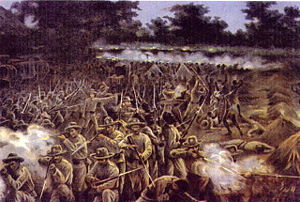| An editor has performed a search and found that sufficient sources exist to establish the subject's notability. Please help improve this article by adding citations to reliable sources. Unsourced material may be challenged and removed. Find sources: "Battle of Marracuene" – news · newspapers · books · scholar · JSTOR (September 2024) (Learn how and when to remove this message) |
| Battle of Marracuene | |||||||
|---|---|---|---|---|---|---|---|
| Part of Campaigns of Pacification and Occupation | |||||||
 Painting of the Battle | |||||||
| |||||||
| Belligerents | |||||||
|
| Ronga forces | ||||||
| Commanders and leaders | |||||||
| António Enes | |||||||
| Strength | |||||||
| 2,000 soldiers | 2,000 soldiers | ||||||
The Battle of Marracuene (Portuguese: Combate de Marracuene), also known as the Battle of Gwaza Muthini, was a military confrontation that was fought on February 2, 1895, near Marracuene, Portuguese Mozambique, between Ronga rebels and Portuguese forces. There were over 2,000 Ronga troops in the conflict. António Enes, the Portuguese Royal Commissioner, assembled over 2,000 European soldiers. The Portuguese, armed with machine guns and repeating rifles, won the confrontation. The date of the battle is celebrated in Mozambique.
References
- ^ Dhlamini, Khulani Aubrey (29 February 2012). "Mozambique, A Work in Progress". Independent Online. Archived from the original on 22 September 2024. Retrieved 22 September 2024.
- Pélissier, René (1989). Naissance du Mozambique: Résistance et Révoltes Anticoloniales (1854–1918) (in French). Orgeval: Pélissier. ISBN 978-2-902-80406-1.
- ^ Wheeler, Douglas L. (1968). "Gungunyane the Negotiator: A Study in African Diplomacy". The Journal of African History. 9 (4): 585–602. doi:10.1017/S0021853700009051. JSTOR 180146 – via Cambridge University Press.
- Bertelsen, Bjørn Enge (2003). "'The Traditional Lion Is Dead': The Ambivalent Presence of Tradition and the Relation between Politics and Violence in Mozambique". Lusotopie. 10: 263–281 – via Persée.
Further reading
- "História de Moçambique - Formação e oposição", René Pélissier, Editorial Estampa, 3.ª Edição, Lisboa, 2000, Volume II, pp. 273.
This article about a battle in Portuguese history is a stub. You can help Misplaced Pages by expanding it. |
This African history–related article is a stub. You can help Misplaced Pages by expanding it. |